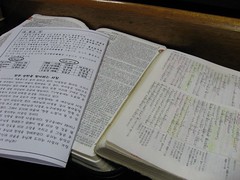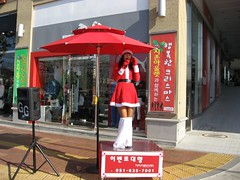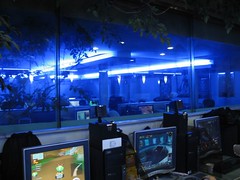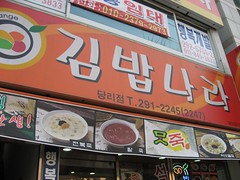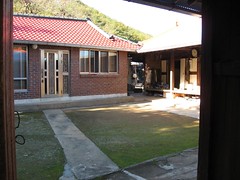Aside from not finding much time to study, my Korean language education has hit another, more unexpected snag. When I was learning Japanese I made great progress writing out (eventually 1,400) cue-cards with Japanese words in hiragana and katana as appropriate. While this didn't help me much with learning to read - most Japanese words are written in Chinese characters - it did wonders for my spoken Japanese and listening comprehension. But the modern Korean transliteration standard, while providing a basis for the pronunciation of words, doesn't always accurately represent the actual pronunciation, where syllables (arranged in blocks of characters) can change in sound depending on the immediately proceeding or succeeding syllable. This can mean 'ㅆ' forming a long 's' sound or a 't', or 'ㄹ' being a 'l' or an 'n'.
This presents a real problem in working through cue-cards, because it would be easy to start memorising incorrect pronunciations in a way that was very hard with Japanese. Since I didn't want to have to ask my girlfriend sit with me through every hour of study, reading each card as I drill through words and phrases, I looked for a solution.
Spurred on by the discovery yesterday evening of a 'Korean Audio Word of the Day' Google widget from
Declan Software (which incidentally insists 순 translates as 'lip' which my girlfriend said was just plain wrong), I looked into whether
Microsoft's text-to-speech would support Korean. Although I thought it was a vain hope to begin with, there did in fact turn out to be a Korean voice, but I couldn't get it to work with either XP, Office or Agents, which led me into third party and web-based tools, where I found this useful
NeoSpeech demo page.
NeoSpeech led in turn to the discovery of
TextAloud, where NeoSpeech and other compatible voices are sold. While a TextAloud demo succeeded in getting the Microsoft Korean voice to work, the quality was predictably robotic - though my girlfriend thought at first it was reading with a North Korean accent - make of this what you will... Having satisfied myself that a combination of TextAloud and the NeoSpeech Korean 'Yumi' voice was the best, I bought them. Purchasing was fairly painless but the voice file was a 550Mb download which took a while.
Later I went back to look at the Declan Software site again, and purchased their
Korean Flashcards product. Initial impressions are that this is going to be really useful, as it provides audio alongside the flashcards and this should really accelerate my learning and pronunciation. However, there is a slight caveat. My girlfriend just shook her head on hearing some of the words and phrases saying there were either just wrong or used odd language that no-one would actually use. So I've started working through the 3,600 words and phrases deleting the ones she disagrees with and editing the English descriptions of others where she feels Declan's doesn't match her translation. It's great that the software allows this kind of functionality (I believe you can even add your own words and audio clips into the system), but it's a shame that I currently find myself deleting about 10% of what was in there. Anyway, as a former Windows developer it's not often I come across software that seems well-designed and really knows exactly what you want to do with it so well-done Declan, even if we're going to have to agree to disagree about some of your content.
This afternoon a Casio EW-K2500 electronic dictionary I'd ordered arrived, opening up a third-front in my attack on the Korean language. Although it's a little bigger than I expected (I really should have taken more care in measuring the dimensions), I'm intending to carry it around with me so I can try and translate things as I go. At the very least, it should give me something to do in restaurants while everyone else talks!
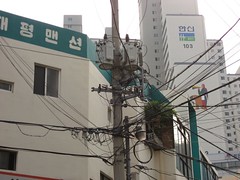 I was walking home recently, when in sight of our apartment, the buildings around it lit up momentarily, and a thunderous bang followed almost instantly. Had I been in the UK, I would have thought it was a bomb going off, instead my first thought was of a serious road accident. I suppose that tells you something about my social impressions of both countries.
I was walking home recently, when in sight of our apartment, the buildings around it lit up momentarily, and a thunderous bang followed almost instantly. Had I been in the UK, I would have thought it was a bomb going off, instead my first thought was of a serious road accident. I suppose that tells you something about my social impressions of both countries.